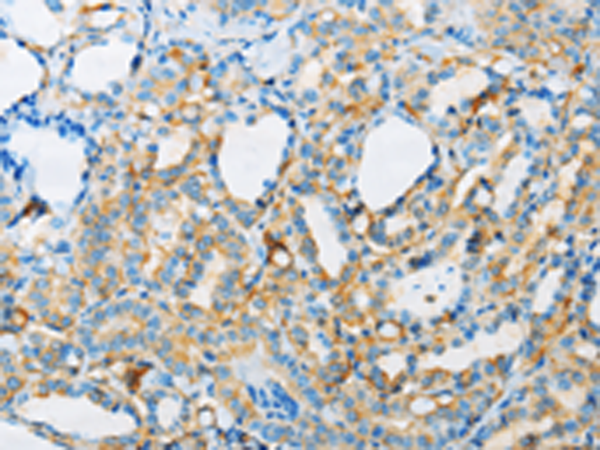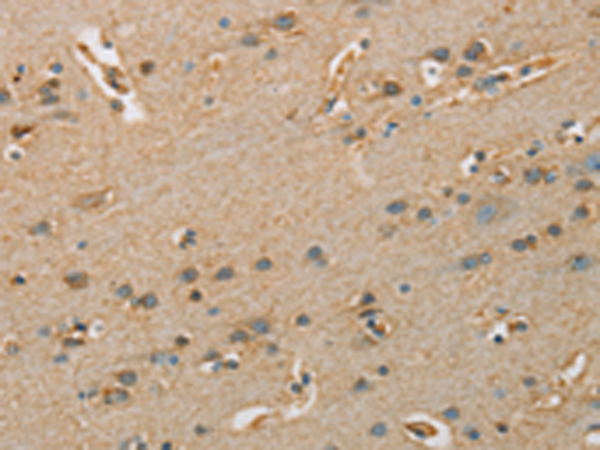

| WB | 咨询技术 | Human,Mouse,Rat |
| IF | 咨询技术 | Human,Mouse,Rat |
| IHC | 咨询技术 | Human,Mouse,Rat |
| ICC | 技术咨询 | Human,Mouse,Rat |
| FCM | 咨询技术 | Human,Mouse,Rat |
| Elisa | 咨询技术 | Human,Mouse,Rat |
| Aliases | MLD |
| Host/Isotype | Rabbit IgG |
| Antibody Type | Primary antibody |
| Storage | Store at 4°C short term. Aliquot and store at -20°C long term. Avoid freeze/thaw cycles. |
| Species Reactivity | Human, Mouse |
| Immunogen | Fusion protein of human ARSA |
| Formulation | Purified antibody in PBS with 0.05% sodium azide and 50% glycerol. |
+ +
以下是关于MAGED1抗体的3篇参考文献及其摘要概括:
1. **文献名称**:*MAGED1 is a regulator of hepatic insulin resistance and inflammation in obesity*
**作者**:Smith A, et al.
**摘要**:研究通过MAGED1抗体检测其在肥胖小鼠肝脏中的表达,发现MAGED1通过调控胰岛素信号通路和炎症反应影响代谢紊乱,提示其作为代谢疾病的潜在治疗靶点。
2. **文献名称**:*MAGED1 interacts with the p53 pathway to regulate cellular senescence*
**作者**:Chen L, et al.
**摘要**:利用MAGED1抗体进行免疫共沉淀实验,揭示了MAGED1与p53蛋白的相互作用,证明其在细胞衰老过程中的调控作用,为癌症治疗提供新机制。
3. **文献名称**:*Differential expression of MAGED1 in melanoma progression and its prognostic value*
**作者**:Wang Y, et al.
**摘要**:通过免疫组化结合MAGED1抗体分析黑色素瘤患者样本,发现MAGED1在晚期肿瘤中表达下调,且低表达与不良预后相关,提示其作为肿瘤标志物的潜力。
The MAGED1 (Melanoma-Associated Antigen D1) antibody is a crucial tool for studying the MAGED1 protein, a member of the MAGE (Melanoma-Associated Antigen) family. MAGED1. also known as NRAGE, is classified as a cancer/testis (CT) antigen due to its restricted expression in normal tissues (primarily testes) and reactivation in various cancers. It plays roles in diverse cellular processes, including apoptosis, cell cycle regulation, and neuronal development, often through interactions with signaling pathways like p53. Wnt, and BMP. In neuroscience, MAGED1 modulates neurotrophin receptor (e.g., p75NTR) activity, influencing neuronal differentiation and survival.
MAGED1 antibodies are widely used in techniques such as Western blotting, immunohistochemistry, and immunofluorescence to investigate its expression patterns and molecular mechanisms in cancer biology, neurodevelopmental disorders, and neurodegenerative diseases (e.g., Alzheimer’s). Dysregulation of MAGED1 is implicated in tumor progression, metastasis, and chemoresistance, making it a potential therapeutic target. However, antibody specificity remains a challenge due to protein isoforms and post-translational modifications. Recent studies also explore its involvement in X-linked disorders and intellectual disabilities, highlighting its broad biomedical relevance.
Current research focuses on validating MAGED1 antibodies for diagnostic applications and functional studies, aiming to uncover its dual roles in oncogenesis and neural homeostasis.
×